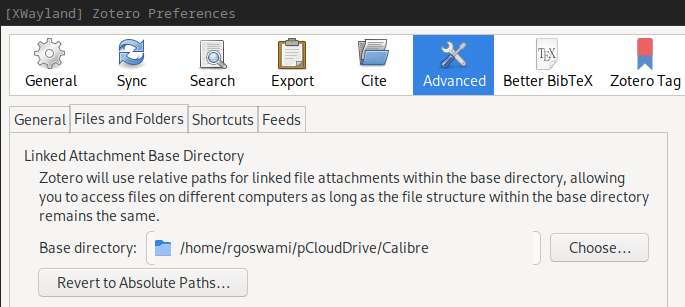5 minutes
Written: 2023-08-19 13:33 +0000
Managing cloud based calibre libraries
This post is part of the Modern Reading series.
Ruminations on cross-cloud library management
Background
I have a set of different devices across which I need to sync my library (described in an earlier post). Ideally this should be a lazy synchronization mechanism and be as general as possible.
Constraints
calibre should never be modifying the files while they are being synced, not
only because it creates and removes a lot of temporary files and folders which
will cause churn, but also because it actually locks files during modification
and this leads to permission issues.
Approximations to solutions
0th: Cloud native synchronization tools
I use pCloud, which has a nifty GUI client (and CLI) across my operating systems which essentially provides a mounted drive.
- Store directly on the drive
- Very slow, since many directories and temporaries are created
1st: GUI based synchronization
Next we can consider using sync via the GUI. This essentially binds two
folders together and continuously ensures they are up to date.
- This syncs continuously and so ended up with permission errors
2nd: rsync to mounted drive
As a slightly more complicated workflow we can use a local synchronization tool
on a cron schedule to sync to the drive mount.
1rsync -avP /path/to/source/directory/ /path/to/destination/directory
Pros
cronjob can be linked to triggers like:- Checking if
calibreis running - Checking for network / power requirements
- Checking if
Cons
- This doesn’t really sync immediately, and the delay might be pretty significant if earlier jobs are skipped
3rd: Use rclone manually
rsync is really meant for SSH connections, while Rclone is fantastic for
working with cloud providers. Setting this up is a breeze.
1rclone config
2# Best to encrypt it
3rclone sync -P /path/to/calibre/library remote-name:/path/in/pcloud
Pros
- Simple setup
Cons
- Manual, so this will need to be run every time
Coupling to calibre
calibre is the only program which is supposed to manage the libraries. In that
sense, it makes sense to strongly couple syncing with calibre. Most of my
machines have gnome-keyring installed, and rclone supports secrets stored in
password managers so:
1secret-tool store --label="rclone" service "rclone" user "calisync"
Which can then simply be set to RCLONE_PASSWORD_COMMAND and used directly:
1export RCLONE_PASSWORD_COMMAND='secret-tool lookup service "rclone" user "calisync"'
2rclone sync -P CalibreLibs/Synced pCloud:/Calibre --ask-password=false
Putting this together, we can wrap calibre runs in a script:
1#!/bin/bash
2# $HOME/.local/bin/calibre_and_sync.sh
3
4# Start calibre and wait
5calibre
6wait $! # optional really, but a bit safer
7
8# Setup and run sync
9RCLONE_PASSWORD_COMMAND='secret-tool lookup service "rclone" user "calisync"'
10rclone sync -P ~/CalibreLibs/Synced pCloud:/Calibre --ask-password=false
It can be made more fancy if necessary, but should ideally just be customized
for each machine. In any case the script is mostly to be used from a .desktop
file, e.g. in .local/share/applications/CaliSync.
1[Desktop Entry]
2Type=Application
3Name=CaliSync
4Exec=/home/username/.local/bin/calibre_and_sync.sh
5Icon=calibre-gui
6GenericName=E-book library management with cloud sync
7Comment=Start Calibre and sync library with pCloud
8Terminal=false
9Categories=Office;Utility;
Do keep in mind that environment variables are not expanded, so generalizing
this would require a suitable dotfile management system like chezmoi (as seen
here).
Visual Tweaks
The script discussed in the previous section is fine, but it is often nicer to have a visual indication of what’s going on in terms of the upload, especially if there are a lot of files.
1#!/bin/bash
2# $HOME/.local/bin/calibre_and_sync.sh
3
4# Start Calibre and wait
5calibre
6
7# Setup and run sync
8zenity --notification --text="Start syncing"
9RCLONE_PASSWORD_COMMAND='secret-tool lookup service "rclone" user "calisync"'
10(
11 rclone sync -P ~/CalibreLibs/Synced pCloud:/Calibre --ask-password=false \
12 --password-command="$RCLONE_PASSWORD_COMMAND" 2>&1 | \
13 while read -r line; do
14 echo "# $line"
15 done
16) |
17zenity --progress \
18 --title="Syncing Calibre Library with pCloud" \
19 --text="Syncing..." \
20 --percentage=0 \
21 --pulsate \
22 --auto-close \
23 --auto-kill
24zenity --notification --text="Sync completed"
This is nice, but doesn’t actually show the full progress. zenity doesn’t
support embedding a terminal, so the only other option is to spawn a shell.
1#!/bin/bash
2# $HOME/.local/bin/calibre_and_sync.sh
3
4# Start Calibre and wait
5calibre
6
7# Setup and run sync
8zenity --notification --text="Start syncing"
9RCLONE_PASSWORD_COMMAND='secret-tool lookup service "rclone" user "calisync"'
10foot -- sh -c "rclone sync -P ~/CalibreLibs/Synced pCloud:/Calibre --ask-password=false --password-command=\"$RCLONE_PASSWORD_COMMAND\""
11zenity --notification --text="Sync completed"
Integrating with zotero
I’ve dicussed working with Zotero before, but when working with cloud synced calibre libraries, to prevent duplication of files, relative linking of base directory attachments works really well1.

Figure 1: Zotero settings for linking files consistently
Some reasons to do this:
- The main goal of this is to enable keeping notes per-book, which Calibre
doesn’t support
- Also to get easy access without duplicated files on the backing WebDAV service (pCloud in my case)
- Allows easier, more natural
bibtexhandling in Zotero, without going through a sync plugin like ZMI
However:
- Do not rename from Zotero, this will break integration with Calibre
Conclusions
With this setup, it is now fairly trivial to sync libraries across devices, and
thus, to take advantage of suitably large storage devices and local calibre
readers. Android devices and calibre library support has been a bit of a
roller-coaster, especially since Calibre Companion was sold off and abandoned,
but for now, it works, as does Calibre Sync and KoReader. That being said, the
best approach would be pairing this setup with something like FolderSync and
Leger Calibre would be the best but Leger Calibre has gone the way of the dodo,
leaving one with precious little options, though KoReader is still the best
option for local calibre management without cover information.
reprex addenum
This post was executed with binaries at the following versions:
1rclone version
2rclone v1.63.1
3# pcloud 1.14.0
4rsync --version
5rsync version 3.2.7 protocol version 31
6Copyright (C) 1996-2022 by Andrew Tridgell, Wayne Davison, and others.
7zenity --version
83.44.2
As first noted here by Wayne Bivens-Tatum ↩︎
Series info
Modern Reading series
- My Life in E-ink
- Managing Scanned Books
- Managing cloud based calibre libraries <-- You are here!

